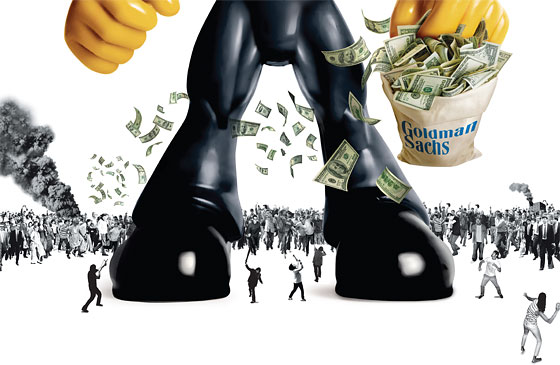
The reputation of Goldman Sachs, the legendary investment bank, which survived the financial crisis in better shape than almost all financial institutions, has now come in for a new series of attacks in the media, some from unexpected media sources, such as Rolling Stone magazine as well as the New York magazine. These articles have in turn generated a wider news agenda.

Recent comments have been more nuanced than the general attack on all banks earlier in the year; as this time it has primarily focused on Goldman Sach's access to power particularly under President Bush, and how the bailout of the banks and other key financial institutions such as the insurance company AIG was especially beneficial for the organisation. Taibbi, the author of the highly critical article in Rolling Stone would say even saved Goldman Sachs.
The Financial Times this week, entered the fray about Goldman Sachs, as it had commissioned WPP company Brand Asset Consulting, to do a major survey on the attitude of US citizens to financial organisations. This large 17000 people survey, which one assumes had taken place prior to these recent critical articles, highlighted that the reputation of Goldman Sachs had suffered over the last two years, more for example, than Morgan Stanley which has been noticeably less successful. The FT quoted survey organiser, Anne Rivers, that "Goldman Sachs still has that Gordon Gekko look to it among the general public,” referring to the villain of the 1987 film Wall Street.
It raises an interesting point about corporate reputation which the New York magazine suggests, that Goldman Sachs may be suffering as it is seen as too successful and powerful. Can too much success be damaging for the corporate reputation of a major organisation - Microsoft might suggest this is feasible. But is this the reason in the case of Goldman Sachs?
I think the problem is related to the fact that financial organisations are still coming to grips with the new order. They are no longer "Masters of the Universe" - able to set the political and financial agenda - which for the last 20 years they have been able to do so, with governments in awe of them. The financial community needs to think about the concept of a "licence to operate". Social legitimacy draws on, amongst others, Habermas and communicative action and that organisations need to earn the right to operate. The financial sector has been a classic example of a sector which has "colonised" and so distorted the communicative process with wider society about its role i.e set the agenda, not listened carefully to society and other interest groups.
The financial crash and rescue of the financial community by international governments has changed all this. I would suggest that society is now requiring that large financial organisations like Goldman Sachs need to be more than just financial technocrats and need to articulate more strongly how they are contributing to society. This is not something which changes over night but, I would suggest, is an important element of corporate reputation and the latest comments from the Head of Communications at Goldman Sachs suggests that this lesson is still being learned, as the Reuters blogger suggests.





No comments:
Post a Comment